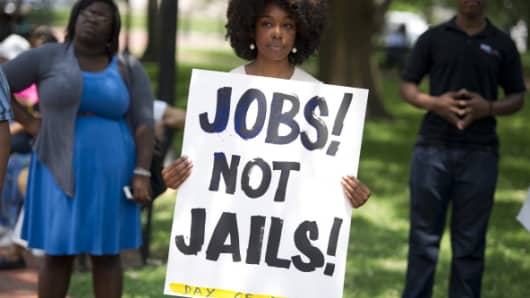The U.S.' drug policy has led to a massive increase in incarceration rates in the country. According to the latest figures from the Justice Department's Bureau of Justice Statistics (BJS), the number of people incarcerated in local, state and federal jails stands at 2,239,751.
The prison population has risen vastly in the past three decades, from 474,368 prisoners in 1980, to a high of 2,292,100 prisoners in 2009.
The U.S. now has 716 prisoners per 100,000 citizens - the highest figure in the world - according to the Sentencing Project, a number far higher than other developed countries like France (96) and Germany (85), as well as developing nations like Rwanda (595) and Brazil (253).
According to the Sentencing Project, in 1980 there were 41,000 people in U.S. prisons for drug offences, while in 2011 the number had reached 498,600.
(Read more: Britain encouraged to build US-style 'super-prisons')
Black people account for 40 percent of the prison population in the U.S. but only 12 percent of the population.
Will.i.am said that the "War on Drugs" has been lost: "It hasn't been successful, we haven't kept drugs off the streets…America's war on drugs hasn't kept one drug off the streets. Matter of fact, it's created more AIDS-infected babies, because the only way these babies are getting AIDS is because of needle sharing."
U.S. Attorney General Eric Holder said in August at the American Bar Association that "a vicious cycle of poverty, criminality, and incarceration traps too many Americans and weakens too many communities…However, many aspects of our criminal justice system may actually exacerbate this problem, rather than alleviate it."
The U.S. Justice Department is now expected to begin to reform its drug policies, and stop charging certain low-level and non-violent drug offenders with mandatory minimum sentences.
Will.i.am proffered, "Why can't we have a war on education and everyone in inner city has access to how to use the information with real skill sets."
Will.i.am said he believed the Internet age offered an opportunity for people in poverty to access better education. "They are serving 10 years, 20 years, and there's no skill set," he said, describing the large prison population when they emerge from incarceration.
"They have no skill set, there are no opportunities in their neighbourhood, undeserved, underdeveloped, everything to do with technology, or lack of technology, lack of information, lack of opportunity. So now that we live in this world, we are moving towards this world where everyone has access to the same information."
U.S. President Barack Obama mentioned such difficulty for African Americans in his speech at the Lincoln Memorial on the 50th anniversary of the March on Washington for Jobs and Freedom.
The nation's first African-American president said that the black population still faced huge challenges when it came to voting rights and a "pipeline from underfunded schools to overcrowded prisons."
CNBC Meets: will.i.am will air on Wednesday 11 September.
— By CNBC's Kiran Moodley. Follow him on Twitter
@kirancmoodley




